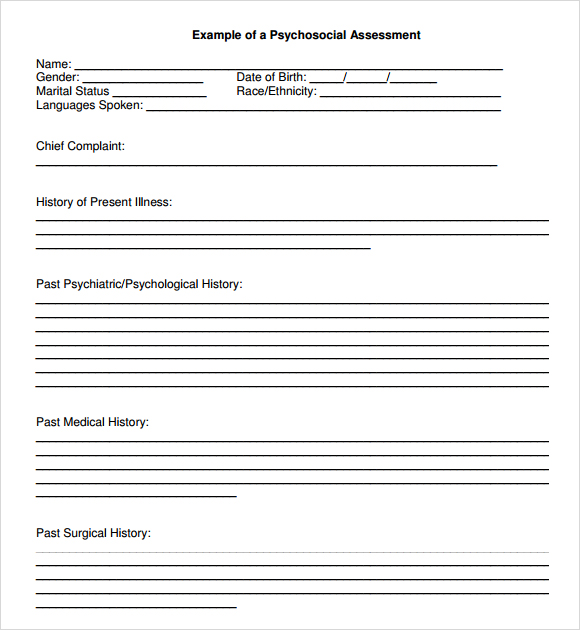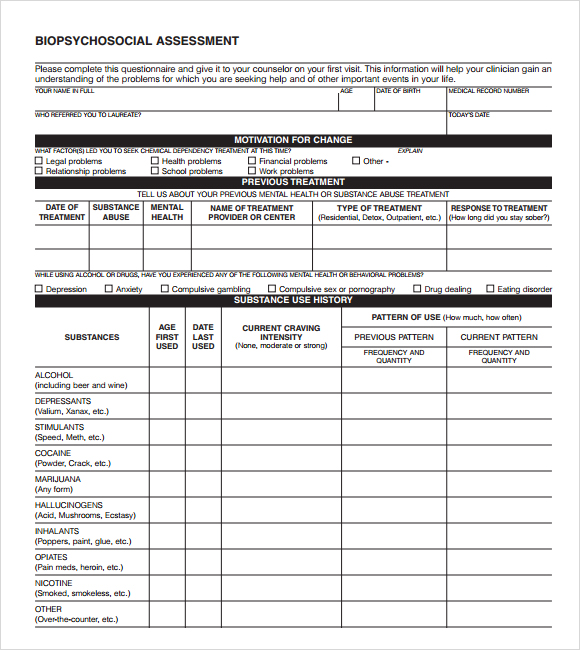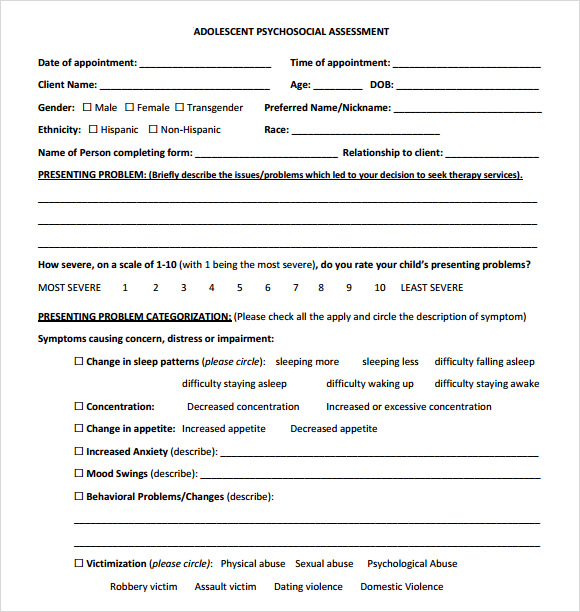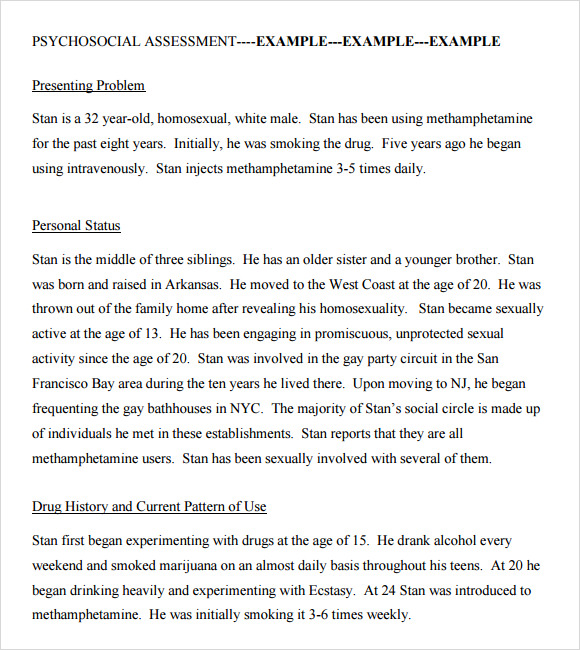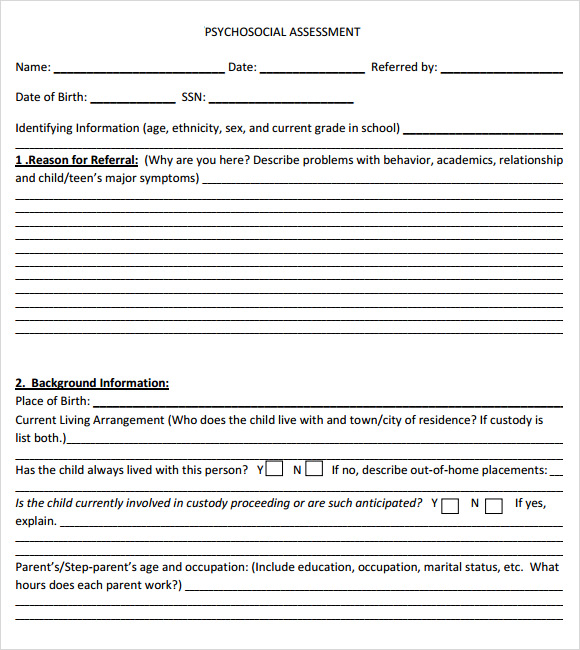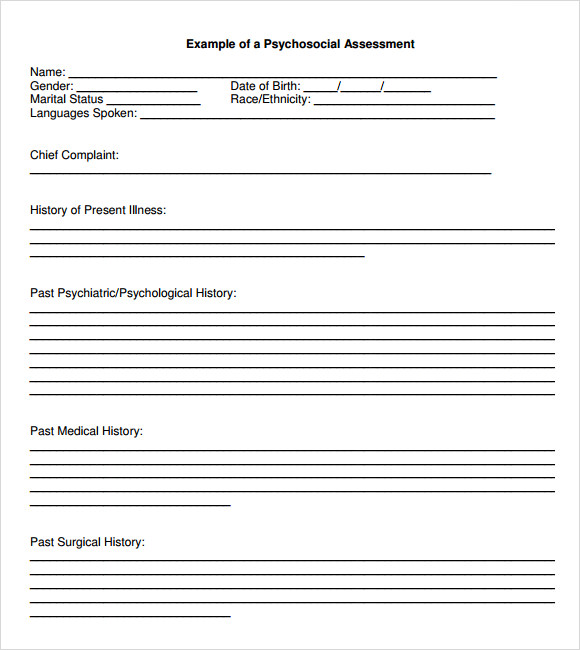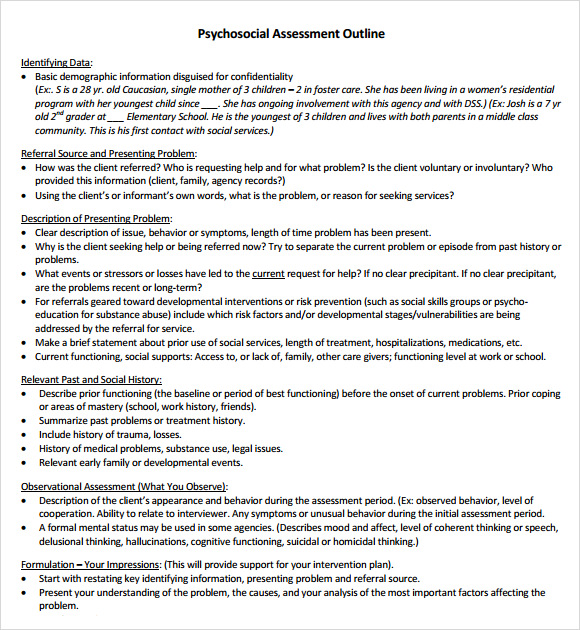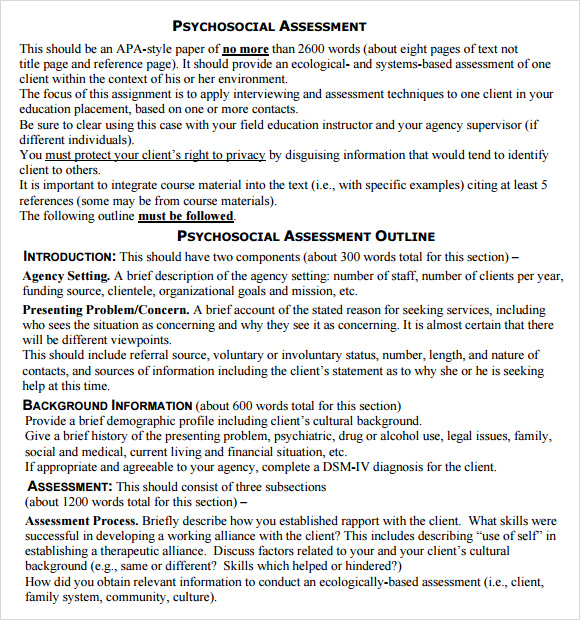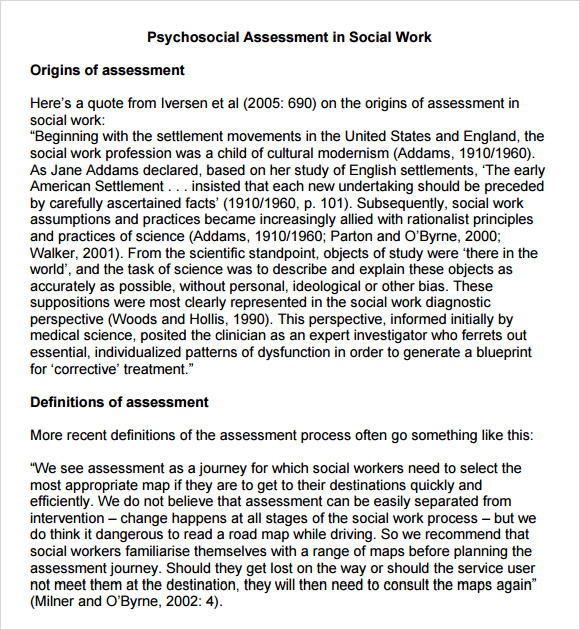Psychosocial assessments are becoming more and more necessary because of the rapid change in socioeconomic structures which are leading to psychological changes as a result. Especially children and adolescents are the major victims of these changes. Thus for behavioral improvements as well as social studies these sample assessments are quite indispensable.
A psychosocial assessment templates Like psychosocial assessment templates must include fields like the age, occupation, health issues, hobbies and aspirations of the candidate. If the assessment is done on a particular sector of the society, social analysis essay can become a lot easier. These samples and examples are often available in Word or Excel formats, sometimes completely free of cost.
Psychosocial Assessment Format
The form for the assessment must begin with the adding up the personal details of the person. This may include details about his or her work and age and them coming up to the problems faced by them, important measure taken, any medical or psychological treatment if they would have underwent. It can be designed as per the requirement. You may also see psychosocial assessment forms
Psychosocial Assessment Example
Since the technology has been in the process of evolution therefore the social and also the psychological status of the person’s life also keeps on changing. With all these changes it is necessary to keep a check on the problems faced by the society revolution to the society. As to the revolution to the society has also been a task. The template helps to design the template easily without any mistake.You may also see formal assessments.
Psychosocial Assessment Questions Template
It is necessary to choose the right questions which have to be placed in the assessment form. It must be direct and start on the objective. The template helps to guide towards the perfect document for the assessment. It is more likely a survey which is held has to check the problems and end up with the conclusion of the problems.
Why Does One Need a Psychosocial Assessment Template?
It is not easy to Sync up the life with the current status of the society. With the ongoing technical events there have been different changes that occur every time. There are so many unheard and unseen things that occur in daily life of the person. You can also see project assessment
The psychosocial Assessment template helps to sketch and put up the proper layout of the assessment form in order to include the psychological and social behavior of the person and how has it affected their ay and pattern of living.You may also see self assessment examples
Psychosocial Assessment in PDF
The psychosocial assessment example must include all the details like the date with all the specific details to be mentioned. The psychosocial Assessment Template helps to sketch out the form regarding the different purpose like the event of family planning. This can include many details about the person and the family which can be a big issue for the coming society about population.You may also see informal assessment
Sample Psychosocial Assessment Template
When Does One Need a Psychosocial Assessment Template?
Generally one is in need of a template is when the person is new to something. A template helps to frame things properly and under proper format. With the help of the psychosocial Assessment template one can easily sketch the social and psychological behavior status of the person which in turn can guide for the best rules in making the assessment and to carry on with it and stating the problems faced by them.You may also see self care assessment samples.
The forms must include the specific details of the person and what problems have they been facing from the change that has happened to them. You can also see health assessment
Psychosocial Assessment Template
Psychosocial Assessment Outline Template
Standard Psychosocial Assessment Template
Psychosocial Assessment in Social Work Template
Benefits of Having the Psychosocial Assessment Template
Well assessments like this have always been helpful for the person to sketch out the detail and also the format of assessment. It helps to dwell deep in the society so as to frame and dig up the root cause of the problems with proper analysis. Have a look at the benefits of having the template. You may also see biopsychosocial assessment
1. A template for the psychosocial assessment helps to design the social cause which must be framed properly and should include the valid questions that makes sense.You may also see army risk assessment
2. It also keeps the record of the changes occurred in the society.
The psychosocial Assessment template helps to design the social and psychological assessment reports of the society properly in a correct format and layout. It helps to analyze the different [problems being faced by the people at different levels. The assessment template helps to keep in mind, the important point and the key elements which are to be included while making the form.You may also see functional behavior assessment
If you have any DMCA issues on this post, please contact us!
Related Posts
Retirement Speech Samples & Templates
Weekly Schedule Samples & Templates
Contractual Agreement Samples & Templates
FREE 9+ Amazing Sample Church Bulletin Templates in PSD | PDF
Sample Business Card Templates
Sample Cashier Job Descriptions
Questionnaire Samples
FREE 10+ Sample HR Resource Templates in PDF
FREE 10+ HR Consulting Business Plan Samples in MS Word | Google Docs | Pages | PDF
FREE 49+ Sample Job Descriptions in PDF | MS Word
FREE 16+ Nonprofit Budget Samples in PDF | MS Word | Excel | Google Docs | Google Sheets | Numbers | Pages
FREE 13+ Academic Calendar Templates in Google Docs | MS Word | Pages | PDF
FREE 10+ How to Create an Executive Summary Samples in Google Docs | MS Word | Pages | PDF
FREE 23+ Sample Event Calendar Templates in PDF | MS Word | Google Docs | Apple Pages
Company Profile Samples

